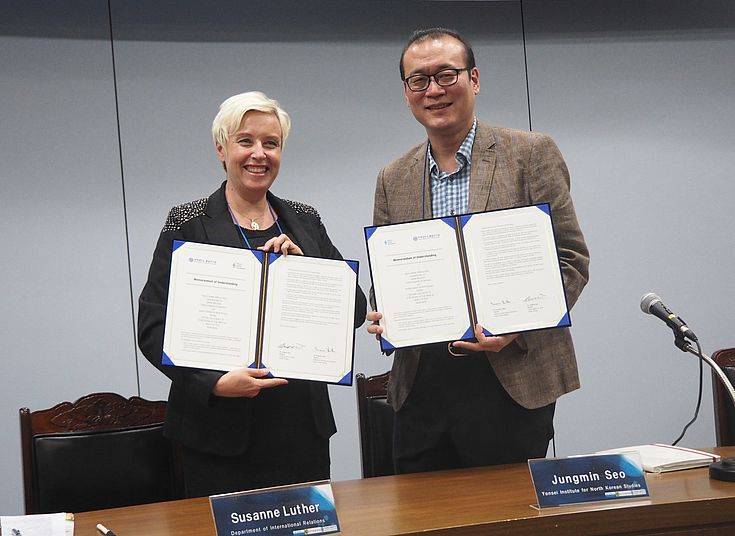Workshop: North Korea after the 7th Party Congress – Political and Economic Perspectives
Dr. Susanne Luther of Hanns Seidel Foundation and Prof. Jungmin Seo of Yonsei University signed a MoU on continued collaboration.
But beyond these sanctions many see engagement and cooperation still as a tool to contribute to change in North Korea. In addition to that, small but visible changes on the economic level could be seen, such as the increasingly open market system. Therefore, hopes and expectations after the announcement of a 7th Party Congress of the WPK were high at the beginning. But how must the situation be assessed today, after the Party Congress and the sanctions? What economic and political perspectives can be identified for North Korea?
In light of this development, the Yonsei Institute for North Korean Studies together with Hanns Seidel Foundation Korea hosted a workshop on the 30th of May 2016 to examine and discuss these questions from different perspectives. As part of this event Dr. Bernhard Seliger, Resident Representative of Hanns Seidel Foundation Korea, as well as Christopher Green, Co-Editor of Sino-NK, and Michael Spavor, founder of Paektu Cultural Exchange, presented their personal opinions on the present economic situation and the possible perspectives for North Korea.
Moreover, it was a special honor to welcome the head of the Department of International Relations of Hanns Seidel Foundation, Dr. Susanne Luther, from Munich. Besides Prof. Jungmin Seo, Director of the Yonsei Institute for North Korean Studies, Dr. Luther gave an opening speech, in which she expressed her personal interest in the topic. Only a few days before, she had had the chance to gather her own personal impression of the current situation. Among other things she examined the progress of the EU funded project for sustainable forestry in North Korea.
After the open section of the event, Christopher Green gave the first presentation examining the current situation in North Korea after the 7th Party Congress and presented his own evaluation. In his opinion, there were almost no changes visible after the event so far. There has been minor personnel restructuring, but not on the relevant levels. Altogether he came to the conclusion that youth does not always lead to more dynamism and that personnel changes can not be equalized with policy changes. Only in the course of time the real North Korean policy changes caused by this event will be identifiable.
Furthermore, the economic perspectives of North Korea were discussed and explained based on the personal impressions of Michael Spavor and Dr. Bernhard Seliger, who have the opportunity to travel to the country on a regular basis due to various projects. In particular the development of the North Korean domestic market was discussed in this context, with the decreasing number of Chinese vendors and the growing range of local goods as a, according to Spavor, positive development. This development could especially be observed during the International Trade Fair in Pyongyang at the end of March 2016. Additionally, Dr. Seliger emphasized the importance of making it possible for the poorer rural population to benefit from this progress, too.
Another aspect of the discussion was the impact of the sanctions on the economic situation in North Korea. It was reported that until now on site in North Korea no major changes could be identified, because many loopholes to avoid restrictions still exist. On the other hand, it was pointed out that those measures need a certain amount of time before they show their real potential. Additionally, it was stated that in order to achieve an effective impact a strict enforcement of sanctions from the Chinese side is needed, which cannot be seen so far.
Moreover, the speakers discussed the option of foreign direct investments. It was stressed that in particular due to the current circumstances and events, but also due to the negative reputation and the lack of certainty for investment activities in North Korea many foreign investors refrain from investing. Examples like the investments of Pyoenghwa Motors or Orascom have made this kind of uncertainty and problems clear in the past years.
At the end of the event the audience had the chance to direct a few questions directly to the three speakers, which were discussed controversially.
This workshop, organized by Hanns Seidel Foundation and Yonsei University, marked another important step of the successful collaboration between the two parties. The intention of HSS and Yonsei University for continued cooperation was enacted through the signing of a MoU by Dr. Susanne Luther and Prof. Jungmin Seo.

